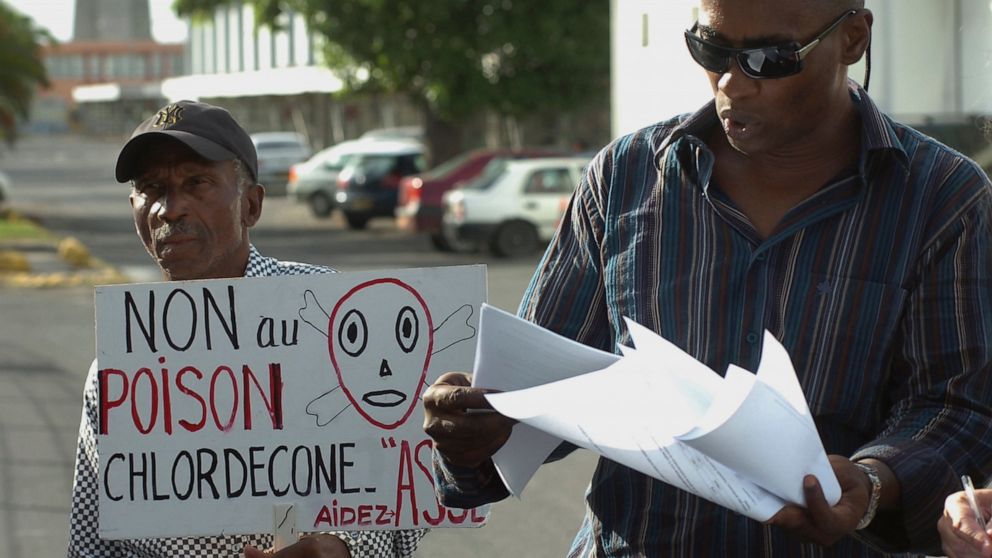San Juan, Puerto Rico — A Paris court found the French government guilty of wrongful negligence involving the past use of a pesticide banned in the French Caribbean islands of Guadeloupe and Martinique, but refused to compensate those affected, it said on Monday. officials.
The decision was bittersweet for activists and lawyers who argued that the French government’s permission to use chlordecone on these islands was illegal as they sought damages for the defendants.
“This decision is a significant step forward in the sense that the fault of the state is recognized,” Christophe Leguevaques, one of the lawyers involved in the case, told The Associated Press. “On the negative side, the court does not recognize financial reparations for victims…. However, West Indians have been exposed and are still exposed to this dangerous product.
The lawsuit is one of at least two brought against the French government over the use of chlordecone in Guadeloupe and Martinique. The first complaint, filed in 2006, is still pending in court and accuses the French government of failing to protect the health of its population and of not doing enough to identify and limit the effects of chlordecone pollution in the two islands. .
On June 25, a judge in France temporarily canceled the trial to allow three months of research.
“We want the court to convict people who put money before health,” attorney Harry Durimel told the AP, adding that officials were seeking to continue using chlordecone because they were in competition. with banana growers in Latin America. ” They are known. They are ministers, directors and politicians from Guadeloupe and Martinique. … We want them to be judged.
Chlordecone is a pesticide known as Kepone that the United States banned in 1976 and is blamed for slurred speech and other neurological problems. French officials have said they fear it is linked to high rates of prostate cancer in Guadeloupe and Martinique, and some studies have suggested it may be linked to premature births. The Stockholm Convention has banned its production and marketing since 2004.
Chlordecone was marketed legally in France from 1981 to 1990 and was used for three additional years in Guadeloupe and Martinique to control the banana weevil under a derogation granted by the French government. Lawyers and activists argued that the exemption was illegal. In a response filed in April, France’s agriculture minister asked the court to dismiss the complaint, declaring it inadmissible and noted that the government had since taken numerous measures to protect people’s health, including banning fishing. in some areas.
Elie Califer, a lawmaker who represents Guadeloupe, described the recent decision as a significant step forward, but said he would push for the creation of a compensation fund for victims and demand that the government invest in the continued cleaning of still polluted areas, among other things.
“It is high time that the state, responsible for this serious pollution and accountable for this contamination, takes full responsibility,” he said.
The French government has estimated that more than 90% of adults in Guadeloupe and Martinique have been exposed to chlordecone. The islands have a combined population of approximately 750,000 people.
The most recent lawsuit sought, among other things, 15,000 euros ($15,900) for each person who had lived at least 12 consecutive months in Guadeloupe or Martinique since 1972. But the Administrative Tribunal of Paris wrote in its 13-page judgment that the defendants do not mention any personal or detailed element “justifying the damages of anxiety which they invoke”.
However, the court found that there was culpable negligence by the French Ministry of Agriculture and noted that the use of chlordecone permeated Martinique and Guadeloupe and led to the “pollution of certain soils, drinking water and certain marine areas, and that agricultural workers have been exposed to this substance.
In response to the decision, the Guadeloupe government issued a statement noting that blood tests for chlordecone remain free and that more than 3,800 people were tested last year. Officials added that such analyzes will soon be available in Martinique.
In addition, officials said the government is offering free soil testing for farmers and those with gardens, as well as water testing for those who qualify. They also noted that fishermen are already receiving payments for lost income resulting from chlordecone contamination.
Regardless of these measures, Leguevaques, the lawyer, said he recommends that the decision be appealed and that questionnaires be sent to all defendants to obtain details in order to request compensation again. He posted the decision on his website and wrote, “The fight continues.
———
Associated Press reporter Nicolas Vaux-Montagny in Lyon, France contributed.

